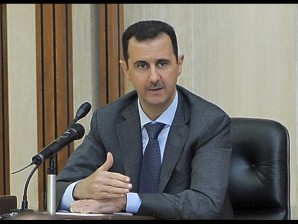LONDON – Syrian President Bashar al-Assad said in a rare interview he is ready to negotiate with the opposition but will not step down, as the UN chief and his Syria envoy offered to broker peace talks between his regime and rebel leaders.
Assad offered to hold talks with rebels to try to end the crisis on condition they lay down their arms, but made a distinction between the “political entities” he would talk with and “armed terrorists”.
“We are ready to negotiate with anyone, including militants who surrender their arms,” Assad told The Sunday Times in a videotaped interview conducted last week in his Damascus residence, the Al-Muhajireen palace.
“We can engage in dialogue with the opposition, but we cannot engage in dialogue with terrorists.”
His offer of talks was aired as UN chief Ban Ki-moon and his Syria envoy Lakhdar Brahimi said they were prepared to broker peace talks between the Assad regime and the opposition.
A joint statement by the pair said the UN would “be prepared to facilitate a dialogue between a strong and representative delegation from the opposition and a credible and empowered delegation from the Syrian government”.
The offer came after both sides in Syria had indicated a “willingness to engage in dialogue”, the UN said.
They also warned that both the regime and opposition fighters “have become increasingly reckless with human life” and said perpetrators of war crimes and crimes against humanity must be brought to justice.
In Tehran on Saturday, Iranian Foreign Minister Ali Akbar Salehi said Assad, who took over as president in 2000 following the death of his father Hafez, would take part in next year’s presidential election and that it was up to the Syrian people to choose their own leader.
Syria is locked in a 23-month-long conflict in which the United Nations estimates more than 70,000 have been killed. But Assad rejected the idea that the fighting is linked to his continued role as president.
“If this argument is correct, then my departure will stop the fighting,” Assad said. “Clearly this is absurd, and other recent precedents in Libya, Yemen and Egypt bear witness to this.”
Assad accused the British government of wanting to arm “terrorists” in his country.
“How can we expect them to make the violence less while they want to send military supplies to the terrorists and don’t try to ease the dialogue between the Syrians?”
Britain has been pushing for the lifting of a European ban on arms supplies to Syrian rebels, but at a meeting last month European Union foreign ministers decided instead to allow only “non-lethal” aid and “technical assistance” to the opposition.
Assad added that “Britain has played a famously unconstructive role in different issues for decades, some say for centuries” and talked of “a bullying hegemony”.
The British government is currently bound by an EU arms embargo which European foreign ministers decided not to lift at a meeting in Brussels on February 18.
British Foreign Secretary William Hague had called for changes to the arms ban “so that we can provide a broader range of support to the National Coalition”, the opposition umbrella group in Syria.
Assad in his interview dismissed the suggestion that Britain could play a constructive role in resolving the fighting, saying: “We don’t expect an arsonist to be a firefighter.”
He accused Britain of wanting to escalate the conflict through its desire to supply military equipment to the rebels.
“How can we expect to ask Britain to play a role while it is determined to militarize the problem?” Assad said.
On the ground, the army said Saturday it had seized control of a key road linking the central province of Hama to Aleppo international airport, the scene of fierce battles since mid-February.
Fierce clashes raged in the northern city of Raqa, where 16 rebels and 10 soldiers were killed, according to the chief of the Britain-based Syrian Observatory for Human Rights, Rami Abdel Rahman.
At least 133 people were killed nationwide on Saturday, the Observatory said.
They included two Palestinians hanged by rebels from trees at Yarmuk refugee camp in Damascus on suspicion of aiding the regime by pinpointing rebel targets, the Observatory said.
The Israeli military said mortar rounds believed to have been fired from Syria hit the southern Israeli-occupied Golan Heights on Saturday without causing damage or casualties.
